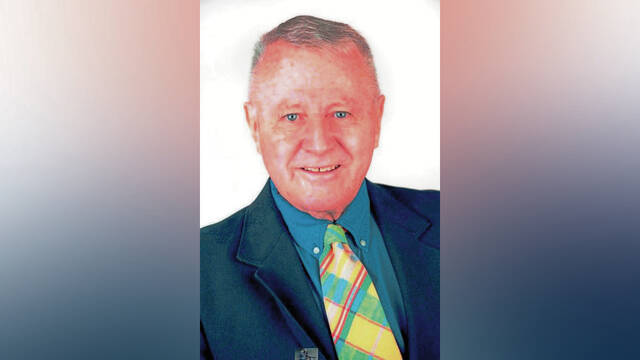Truby Street namesake donated land for Westmoreland's 1st county courthouse
When David Truby was 9 years old in the mid-1940s, his family took a trip to Cook Forest State Park to visit the set of a 1947 film in progress, “Unconquered.”
At the time, David was mostly excited at the chance to meet movie stars Gary Cooper and Boris Karloff. Later in life, he came to appreciate that Cooper’s role, as Capt. Christopher Holden, was based on the life of Col. Christopher Truby, who came to America six generations before David and was instrumental in the formation of Westmoreland County as well as its courthouse, where in 2023 work is winding down on the current building’s front courtyard and parking garage.
“It’s just all really interesting,” said Truby, 85, of Armstrong Township, a former Indiana University of Pennsylvania professor, editor for the National News Service and author. “A friend and I once spent a month traveling from State College down to Pittsburgh, mostly visiting museums and historical places, and collected a lot of information about Col. Truby.”
Christopher Truby was born in 1736 in Bucks County. In 1760, he married Isabella Bauman in Bethlehem. Three years later, he was an ensign in Captain Jacob Wetterholt’s Company of York County Militia, enlisting to fight in the Revolutionary War in 1776 and serving in the First, Second and Eighth Battalion of Westmoreland County.
Christopher Truby was also responsible for the construction of Fort Allen, built in 1774 to guard against Native American attacks on recent German settlers. He named it after the Carbon County fort where he was stationed when he met his wife.
During the 1782 attack on Hanna’s Town, Christopher Truby’s 4-year-old daughter Mary Ann was captured by Native Americans and taken hostage. A group of neighbors followed her captors up to modern-day Clarion County and were able to rescue Mary Ann, according to David Truby’s research.
As one of the largest landowners in Westmoreland County when it was formed, Christopher Truby provided land for what was then called Newtown. Today it is modern-day Greensburg. Along with fellow early resident William Jack, he also provided land for the first county courthouse and jail, 2.5 acres deeded to the county Dec. 10, 1785, and signed by the county’s board of trustees which included Benjamin Davis, Michael Rugh, Hugh Martin, John Shields and John Pomeroy. Truby was instrumental in moving the seat of government from Hanna’s Town to Greensburg. In addition, Truby Street in Greensburg is named in his memory.
The current Westmoreland County Courthouse is the fourth one to be built. The original, on land provided by Truby, was in use until the early 1800s.
Over the years, Christopher Truby served as a county commissioner, justice of the peace and judge. He died in 1802, originally buried at the Old German Cemetery on South Main Street. That area is a parking lot today, but Truby’s remains were relocated in 1938 to the crypt at Zion Lutheran Church, and the gravestones of Truby and his wife were placed in the church wall near its side entrance.
Patrick Varine is a TribLive reporter covering Delmont, Export and Murrysville. He is a Western Pennsylvania native and joined the Trib in 2010 after working as a reporter and editor with the former Dover Post Co. in Delaware. He can be reached at pvarine@triblive.com.
Remove the ads from your TribLIVE reading experience but still support the journalists who create the content with TribLIVE Ad-Free.


